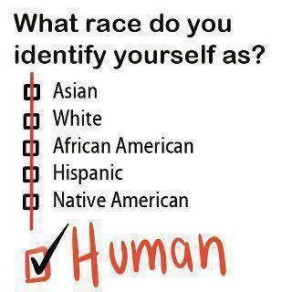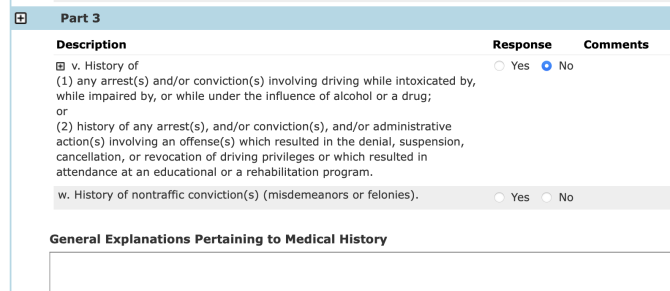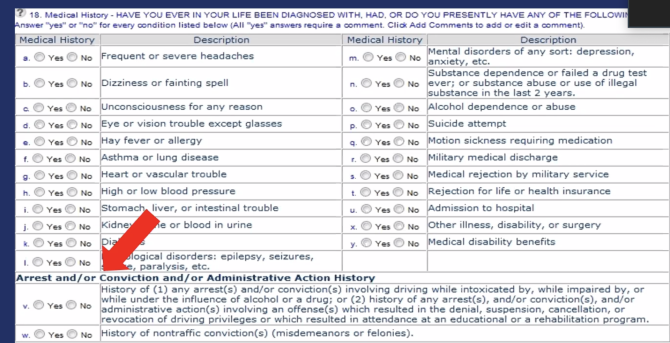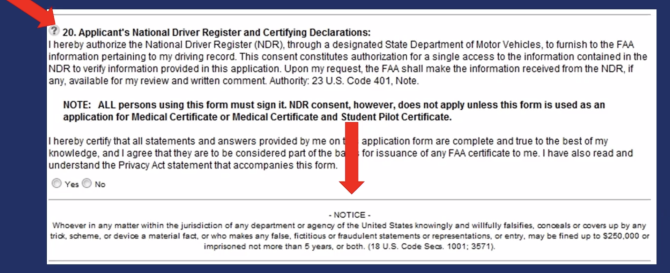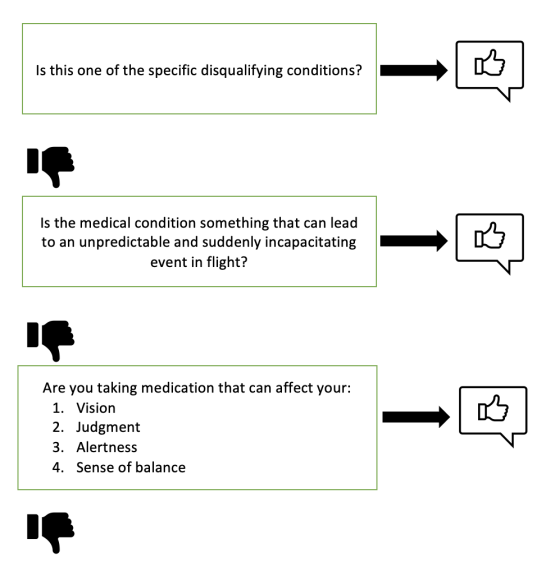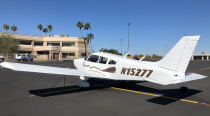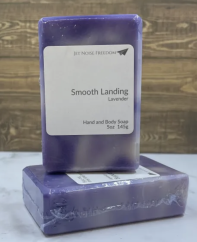
Medical Cases
The Aerospace Medical Certification Division (AMCD) of the FAA is the primary repository for all FAA airman medical records.
As of March 2021, the AMCD houses more than 22 million FAA medical applications and medical records for 3.7 million unique airmen.
The FAA is made up of 9 regions, and each has a regional Flight Surgeon and medical certificate office with staff to assist pilots with many aspects of the medical certification process.
The regional flight surgeons and their staff do medical certification just like the AMCD and serve as safety valves to offset some of the huge workload pouring into the AMCD.
The AMCD philosophy is to find a way to get to a "yes" for as many medical certification issues as possible.
The FAA medically qualifies about 98% of the applicants who submit medical records for consideration.
However, getting to the "yes" sometimes requires time and testing.
The FAA is working to narrow the scope of medical records needed for review. It depends on the individual situation.
Every applicant's medical history is evaluated on the merits of the available medical history and information provided in support of the application.
NDR - National Driver Registry
When you apply for a medical through MedXpress you give a one-time query consent to the FAA to search the NDR for DUIs.
AME - Aviation Medical Examiner
SODA - Statement of Demonstrated Ability
NCIC - National Crime Information Center
SSA - Social Security Administration
PDR - Physicians' Desk Reference
FAA Civil Aviation Security Division
ALPA - Airline Pilots Association
EAA - Experimental Aircraft Association
Jan 10, 2017: FAA Issues General Aviation Medical Rule
Medical Certification of Small Aircraft Pilots (BasicMed)
(download PDF of final rule below)
Adobe Acrobat document [462.6 KB]
FAA regulations pertaining to medical standards and certification may be found at 14 CFR Part 67
FAA guide for Aviation Medical Examiners - Application Process for Medical Certification and
Medical Certification Decision Making
2024 - FAA Amends Mental Health Evaluation Criteria For Pilots
ADHD and the FAA by Warren Silberman
Guide for Aviation Medical Examiners
Pharmaceuticals (Therapeutic Medications)
Adobe Acrobat document [1.4 MB]
Find an Aviation Medical Examiner (AME)
Title 13 - Criminal Code - Arizona Revised Statutes
When it comes to filling out the application for an FAA Medical Certificate (MedXPress) or BasicMed (CMEC-Comprehensive Medical Examination Checklist), forgetting past indiscretions is NOT an option.
You can use the following to help recall past history for Question 18 (MedXPress) "Have you ever in your life..." or 18(v) "any arrests or convictions involving driving while intoxicated" "arrests, convictions, or administrative actions involving offenses that resulted in the denial, suspension, cancellation, or revocation of driving privileges or that resulted in attendance at an educational or a rehabilitation program" or 18(w) "non-traffic convictions (misdemeanors or felonies)" or CMEC "at any time in your life".
1. Police Reports
2. Court Records
3. If represented by attorney - law firm may have records
4. Identity History Summary from FBI ($18 fee and fingerprint card with request)
5. Department of Motor Vehicles of State (mostly online request)
6. National Driver Registry (NDR) - Notarized Written Request
To see previous Medical Certificate applications submitted to FAA, mail or fax completed copy of AC8060-68 to FAA Aerospace Medical Certification Division. Note FAA does not keep copies of BasicMed applications.
DUI
2024 - Kentucky Aeromed Helo Pilot Sentenced for Flying Drunk
FAA Industry Drug and Alcohol Testing Program
Requirement to file a written report of any conviction for a drug- or alcohol-related traffic offense OR the denial, cancellation, suspension, or revocation of your driver's license related to such an offense
FAA Civil Aviation Security Division - Oklahoma City - no later than 60 days after the conviction or motor vehicle agency action
Consequences are under 14 CFR 61.15
14 CFR 61.15 (a)
14 CFR 61.15 (e)
14 CFR 61.15 (d) (2)
§61.15 Offenses involving alcohol or drugs.
(a) A conviction for the violation of any Federal or State statute relating to the growing, processing, manufacture, sale, disposition, possession, transportation, or importation of narcotic drugs, marijuana, or depressant or stimulant drugs or substances is grounds for:
(1) Denial of an application for any certificate, rating, or authorization issued under this part for a period of up to 1 year after the date of final conviction; or
(2) Suspension or revocation of any certificate, rating, or authorization issued under this part.
(b) Committing an act prohibited by §91.17(a) or §91.19(a) of this chapter is grounds for:
(1) Denial of an application for a certificate, rating, or authorization issued under this part for a period of up to 1 year after the date of that act; or
(2) Suspension or revocation of any certificate, rating, or authorization issued under this part.
(c) For the purposes of paragraphs (d), (e), and (f) of this section, a motor vehicle action means:
(1) A conviction after November 29, 1990, for the violation of any Federal or State statute relating to the operation of a motor vehicle while intoxicated by alcohol or a drug, while impaired by alcohol or a drug, or while under the influence of alcohol or a drug;
(2) The cancellation, suspension, or revocation of a license to operate a motor vehicle after November 29, 1990, for a cause related to the operation of a motor vehicle while intoxicated by alcohol or a drug, while impaired by alcohol or a drug, or while under the influence of alcohol or a drug; or
(3) The denial after November 29, 1990, of an application for a license to operate a motor vehicle for a cause related to the operation of a motor vehicle while intoxicated by alcohol or a drug, while impaired by alcohol or a drug, or while under the influence of alcohol or a drug.
(d) Except for a motor vehicle action that results from the same incident or arises out of the same factual circumstances, a motor vehicle action occurring within 3 years of a previous motor vehicle action is grounds for:
(1) Denial of an application for any certificate, rating, or authorization issued under this part for a period of up to 1 year after the date of the last motor vehicle action; or
(2) Suspension or revocation of any certificate, rating, or authorization issued under this part.
(e) Each person holding a certificate issued under this part shall provide a written report of each motor vehicle action to the FAA, Civil Aviation Security Division (AMC-700), P.O. Box 25810, Oklahoma City, OK 73125, not later than 60 days after the motor vehicle action. The report must include:
(1) The person's name, address, date of birth, and airman certificate number;
(2) The type of violation that resulted in the conviction or the administrative action;
(3) The date of the conviction or administrative action;
(4) The State that holds the record of conviction or administrative action; and
(5) A statement of whether the motor vehicle action resulted from the same incident or arose out of the same factual circumstances related to a previously reported motor vehicle action.
(f) Failure to comply with paragraph (e) of this section is grounds for:
(1) Denial of an application for any certificate, rating, or authorization issued under this part for a period of up to 1 year after the date of the motor vehicle action; or
(2) Suspension or revocation of any certificate, rating, or authorization issued under this part.
14 CFR 67.403 (a) (1)
14 CFR 67.403 (c) (1)
§67.403 Applications, certificates, logbooks, reports, and records: Falsification, reproduction, or alteration; incorrect statements.
(a) No person may make or cause to be made—
(1) A fraudulent or intentionally false statement on any application for a medical certificate or on a request for any Authorization for Special Issuance of a Medical Certificate (Authorization) or Statement of Demonstrated Ability (SODA) under this part;
(2) A fraudulent or intentionally false entry in any logbook, record, or report that is kept, made, or used, to show compliance with any requirement for any medical certificate or for any Authorization or SODA under this part;
(3) A reproduction, for fraudulent purposes, of any medical certificate under this part; or
(4) An alteration of any medical certificate under this part.
(b) The commission by any person of an act prohibited under paragraph (a) of this section is a basis for—
(1) Suspending or revoking all airman, ground instructor, and medical certificates and ratings held by that person;
(2) Withdrawing all Authorizations or SODA's held by that person; and
(3) Denying all applications for medical certification and requests for Authorizations or SODA's.
(c) The following may serve as a basis for suspending or revoking a medical certificate; withdrawing an Authorization or SODA; or denying an application for a medical certificate or request for an authorization or SODA:
(1) An incorrect statement, upon which the FAA relied, made in support of an application for a medical certificate or request for an Authorization or SODA.
(2) An incorrect entry, upon which the FAA relied, made in any logbook, record, or report that is kept, made, or used to show compliance with any requirement for a medical certificate or an Authorization or SODA.
EA - 3863 (1993)
May 2, 2023 - The DOT published a final rule that, among other items, authorizes employers to use oral fluid drug testing as an alternative testing methodology to urine drug testing. The final rule also:
- harmonizes with pertinent section of the HHS oral fluid Mandatory Guidelines,
- clarifies certain Part 40 provisions that cover urine drug testing procedures,
- removes provisions that are no longer necessary,
- adds eight new definitions, clarifying language to definitions and web links, and
- updates provisions to address issues that have risen in recent years.
05/02/2023 - Final Rule (Effective 06/01/2023)
This final rule amends the U.S. Department of Transportation's regulated industry drug testing program to include oral fluid testing. This additional methodology for drug testing will give employers a choice that will help combat employee cheating on urine drug tests and provide a less intrusive means of achieving the safety goals of the program.
In order for an employer to implement oral fluid testing under the Department's regulation, the U.S. Department of Health and Human Services (HHS) will need to certify at least two laboratories for oral fluid testing, which has not yet been done.
The final rule includes other provisions to update the Department's regulation and to harmonize, as needed, with the Mandatory Guidelines for Federal Workplace Drug Testing Programs using Oral Fluid established by HHS.
In addition, this rule amends the FAA, FMCSA, FRA and FTA regulations to ensure consistency within the Department of Transportation and by removing or adjusting references to the word "urine" and /or add references to oral fluid, as well as, removing or amending some definitions for conformity and to make other miscellaneous technical changes or corrections.
- Informational Notices:
Settlement Policy for Commercial Pilots in Drug and Alcohol Testing Cases
FAA Frequently Asked Questions
Excellent articles on Medical Issues in AOPA magazine by Dr. Warren Silberman
Adobe Acrobat document [4.5 MB]
Adobe Acrobat document [19.4 MB]
Adobe Acrobat document [154.8 KB]
Avoiding Adverse Drug Interactions
Impairment from medication, particularly the over the counter (OTC) medication, is cited as a factor in many general aviation accidents. A 2011 study by the FAA Civil Aerospace Medical Institute’s Toxicology Lab found that drugs/medications were found in 570 fatal accident pilots (42 percent of 1,353 autopsies). Ninety percent of those pilots were flying under 14 CFR Part 91. It’s important for pilots also to consider possible adverse reactions when taking more than one drug.
Adobe Acrobat document [1.3 MB]
AME Assisted Special Issuance
AME Assisted Special Issuance (AASI) is a process that provides Examiners the ability to re-issue an airman medical certificate under the provisions of an Authorization to an applicant who has a medical condition that is disqualifying under 14 CFR part 67.
An FAA physician provides the initial certification decision and grants the Authorization in accordance with 14 CFR § 67.401. The Authorization letter is accompanied by attachments that specify the information that treating physician(s) must provide for the re-issuance determination. Examiners may re-issue an airman medical certificate under the provisions of an Authorization, if the applicant provides the requisite medical information required for determination. Examiners may not issue initial Authorizations. An Examiner's decision or determination is subject to review by the FAA.
Special Issuance
At his discretion, the Federal Air Surgeon may grant an Authorization for Special Issuance of a Medical Certificate (Authorization), with a specified validity period, to an applicant who does not meet the established medical standards. The applicant must demonstrate to the satisfaction of the Federal Air Surgeon that the duties authorized by the class of medical certificate applied for can be performed without endangering public safety for the validity period of the Authorization. The Federal Air Surgeon may authorize a special medical flight test, practical test, or medical evaluation for this purpose.
An airman medical certificate issued under the provisions of an Authorization expires no later than the Authorization expiration date or upon its withdrawal. An airman must again show to the satisfaction of the Federal Air Surgeon that the duties authorized by the class of medical certificate applied for can be performed without endangering public safety in order to obtain a new airman medical certificate/Authorization under 14 CFR § 67.401.
CACI
CACI - Conditions AME Can Issue - as of January 2017 there are 16 conditions identified by the FAA, previously requiring approval from the Aerospace Medical Certification Division in Oklahoma City, that can now be issued by the AME at the time of the flight physical
Your AME can make the call without deferral to the Federal Air Surgeon prior to granting your medical certificate in these instances (talk to your AME BEFORE filling out medical application online):
- Asthma that is uncomplicated and has not necessitated frequent emergency-room visits or hospitalizations - asthma
- Diet-controlled Diabetes Mellitus - Pre-diabetes
- High blood pressure - Hypertension
- A solitary kidney stone that has passed with no retained stones
- Retained kidney stone(s)
- Chronic kidney disease
- Uncomplicated peptic ulcer
- Colitis
- Glaucoma
- Migraine and Chronic Headache
- Mitral valve repair
List of FAA-accepted medications - Pilot Medical Solutions, Inc.
Adobe Acrobat document [1.4 MB]
Air Docs
BASICMED
NPRM for Amendments to BasicMed
The FAA is proposing miscellaneous amendments related to medical certification for medical flight tests and a minor change to the Alternative Pilot Physical Examination and Education Requirements
final rule, which amended sections of part 61 and established part 68. In this preamble, these regulations will be referred to as BasicMed.
This rulemaking would implement section 318 (“Commercial Balloon Pilot Safety Act of 2018”) of Public Law 115-254, the FAA Reauthorization Act of 2018. In addition, this rulemaking responds to NTSB Safety Recommendation A-17-034, which recommends that the FAA remove the medical certification exemption in part 61 for commercial balloon pilots receiving compensation for transporting passengers.
BasicMed Begins May 1, 2017
April 24- General aviation pilots can now prepare to fly under BasicMed without holding a Federal Aviation Administration (FAA) medical certificate as long as they meet certain requirements. They can fly under BasicMed beginning on May 1, the effective date of the January 10 final rule. It offers pilots an alternative to the FAA's medical qualification process for third class medical certificates, while keeping general aviation pilots safe and flying affordable.
General aviation pilots may take advantage of the regulatory relief in the BasicMed rule or opt to continue to use their FAA medical certificate. Under BasicMed, a pilot will be required to complete a medical education course every two years, undergo a medical examination every four years, and comply with aircraft and operating restrictions. For example, pilots using BasicMed cannot operate an aircraft with more than six people onboard and the aircraft must not weigh more than 6,000 pounds.
A pilot flying under the BasicMed rule must:·
- possess a valid driver's license;
- consent to a National Driver Register check;
- have held a medical certificate that was valid at any time after July 15, 2006;
- have not had the most recently held medical certificate revoked, suspended, or withdrawn;
- have not had the most recent application for airman medical certification completed and denied;
- have taken a BasicMed online medical education course within the past 24 calendar months;
- have completed a comprehensive medical examination with any state-licensed physician within the past 48 months;
- have been found eligible for special issuance of a medical certificate for certain specified mental health, neurological, or cardiovascular conditions, when applicable; and
- not fly for compensation or hire.
Renewal of BasicMed:
(every 48 calendar months)
- print out 8700-2 - Comprehensive Medical Exam Checklist
- complete section 2
- schedule BasicMed medical exam with any state-licensed physician
- upon completion, physician will return the exam form to the pilot
- pilot takes online medical self-assessment course and complete the brief quiz at the end (pilot can take course as many times as necessary to pass - this is done every 24 calendar months)
- pilot fills out course completion certificate at the end and electronically submit it to the FAA while printing a copy of the certificate of completion.
- it is the pilot's responsibility to maintain these two documents - the Comprehensive Medical Exam Checklist and the Certificate of Completion - and make them available to the FAA upon request (together with a valid driver's license and pilot certificate).
Pilots can read and print the Comprehensive Medical Examination Checklist and learn about online BasicMed online medical courses at www.faa.gov/go/BasicMed.
Microsoft Word document [118.9 KB]
Adobe Acrobat document [92.4 KB]
Adobe Acrobat document [458.5 KB]
Adobe Acrobat document [3.4 MB]
Adobe Acrobat document [4.6 MB]
Adobe Acrobat document [275.1 KB]
Adobe Acrobat document [599.1 KB]
Adobe Acrobat document [4.5 MB]
PILOT RECORDS IMPROVEMENT ACT
AC 120-68G - Pilot Records Improvement Act of 1996
The Pilot Records Improvement Act of 1996 (PRIA), as amended, was enacted to ensure that air carriers and air operators adequately investigate a pilot’s background before allowing that pilot to conduct commercial air carrier flights. Under PRIA, a hiring employer cannot place a pilot into service until he or she obtains and reviews the last 5 years of the pilot’s background and other safety-related records as specified in PRIA.
This advisory circular (AC) is supplemented by the current edition of Federal Aviation Administration (FAA) Order 8000.88, PRIA Guidance for FAA Inspectors, and numerous other documents available on the PRIA Web site at http://www.faa.gov/pilots/lic_cert/pria. These sources of detailed information related to PRIA provide invaluable assistance to the certificate holder or others concerning the PRIA records request process as well as other compliance issues.
Pilot Records Database (PRD)
Notice Number: NOTC8193
The Pilot Records Database (PRD) has been available since January 2017. PRD allows certain aviation employers such as those operating under FAR Parts 121 and 135 to review an aiman's FAA records online after an airman has granted consent via PRD.
This review of an airman's records normally occurs during the hiring process as required by the Pilot Record Improvement Act of 1996 (PRIA).
As part of the PRD release, airman who are applying for employment with an aviation employer may be asked to provide consent which allows the company to review your airman records online via PRD.
ATP and Commercial pilots are invited to log into PRD* and review your FAA airman records. This includes certificate information, incidents or accidents, enforcements, and more. You can also enter your previous aviation employers which will simplify the PRIA process when applying for a new pilot position.
Requirements:
- FAA ATP or Commercial Pilot Certificate
- Current FAA Medical
- Online Identity Verification during account creation
- *Not all users who wish to use PRD will be able to complete the online identity verification process. Those users must continue to use the existing PRIA processes and forms. An alternate registration option will be made available in the future. Subscribe to PRD Updates to stay informed.
Watch a Video showing how to grant consent
Microsoft Power Point presentation [5.4 MB]
Microsoft Word document [91.0 KB]
Microsoft Word document [2.2 MB]
I recently had the good fortune to get my hands on a copy of The Opportunity Maker by Ari Kaplan.
It is a most inspirational read… and I can honestly say I love audio books online now!
Contact Me
Sarah Nilsson, J.D., Ph.D., MAS
602 561 8665
You can also fill out my
Get Social with Me
Legal Disclaimer
The information on this website is for EDUCATIONAL purposes only and DOES NOT constitute legal advice.
While the author of this website is an attorney, she is not YOUR attorney, nor are you her client, until you enter into a written agreement with Nilsson Law, PLLC to provide legal services.
In no event shall Sarah Nilsson be liable for any special, indirect, or consequential damages relating to this material, for any use of this website, or for any other hyperlinked website.
Steward of
I endorse the following products
KENNON (sun shields)
